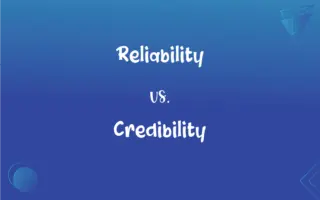Proactive Strategies vs. Reactive Strategies: What's the Difference?
Edited by Aimie Carlson || By Janet White || Published on December 3, 2023
Proactive strategies involve planning and preparing in advance, while reactive strategies respond to events after they occur.

Key Differences
Proactive strategies involve anticipation and planning for future events, while reactive strategies deal with issues as they arise without prior preparation.
Proactive strategies aim to predict and mitigate risks before they happen, whereas reactive strategies address problems after they have occurred.
Proactive strategies provide more control over outcomes, while reactive strategies offer flexibility to adapt to unforeseen situations.
Proactive strategies often require more resources for planning and analysis upfront, while reactive strategies might lead to higher costs in the long run due to lack of preparation.
Proactive strategies can lead to more efficient and effective outcomes, whereas reactive strategies can be less efficient, as they deal with problems after they have become apparent.
ADVERTISEMENT
Comparison Chart
Part of Speech
Noun (Plural)
Noun (Plural)
Verb Association
Involves planning, preparing
Involves responding, adapting
Tense Association
Future-oriented
Present or Past-oriented
Usage in Sentences
Often used with verbs like 'anticipate', 'prepare'
Commonly used with verbs like 'respond', 'adapt'
Syntactic Role
Subject or Object in proactive contexts
Subject or Object in reactive contexts
ADVERTISEMENT
Proactive Strategies and Reactive Strategies Definitions
Proactive Strategies
Strategies focusing on foreseeing potential challenges and preparing for them.
Implementing employee training is a proactive strategy to enhance productivity.
Reactive Strategies
Actions taken in response to unforeseen challenges or crises.
Offering discounts after a sales decline is a reactive strategy to boost revenue.
Proactive Strategies
Initiatives designed to shape or control future events or trends.
Developing new technologies is a proactive strategy to stay ahead in the market.
Reactive Strategies
Reactive strategies involve addressing problems after they arise.
Providing customer refunds after complaints is a reactive strategy for customer satisfaction.
Proactive Strategies
Planning and implementing measures to prevent future problems.
A proactive strategy is to diversify investments to minimize financial risks.
Reactive Strategies
Measures taken to mitigate the impact of unanticipated issues.
Implementing a recall after discovering a product defect is a reactive strategy.
Proactive Strategies
Actions taken in anticipation to manage future risks.
Regular system updates are a proactive strategy to prevent security breaches.
Reactive Strategies
Strategies that respond to events or situations as they occur.
Hiring temporary staff in response to increased demand is a reactive strategy.
Proactive Strategies
Proactive strategies involve early action to optimize future outcomes.
Creating an emergency fund is a proactive strategy for financial security.
Reactive Strategies
Adapting or modifying plans based on current situations.
Changing a marketing campaign in response to consumer feedback is a reactive strategy.
FAQs
What are reactive strategies?
Strategies that respond to events after they occur.
How do proactive strategies improve efficiency?
By preventing problems, they often lead to more efficient outcomes.
Why are proactive strategies important?
They help anticipate and mitigate potential risks before they happen.
Can reactive strategies be effective?
Yes, they can be effective in adapting to unforeseen situations.
Are reactive strategies always negative?
No, they can be necessary and effective in certain unpredictable situations.
Can a business use both proactive and reactive strategies?
Yes, a balanced approach often uses both types of strategies.
What are proactive strategies?
Strategies that involve planning and preparing in advance.
What is an example of a reactive business strategy?
Adjusting marketing tactics in response to a competitor's campaign.
How do proactive strategies affect resource allocation?
They may require more upfront resources for planning and analysis.
What is an example of a proactive business strategy?
Investing in research and development to innovate new products.
How do proactive strategies relate to risk management?
They are integral in identifying and mitigating risks before they escalate.
How do proactive strategies benefit long-term planning?
They contribute to sustainable and stable long-term growth.
Can reactive strategies lead to higher costs?
Yes, lack of preparation can result in higher costs in the long run.
How does technology impact proactive strategies?
Technology enables better forecasting and preparation for future trends.
Can reactive strategies be planned?
They can include contingency plans for unexpected scenarios.
What skills are important for developing proactive strategies?
Forecasting, planning, and risk assessment skills are crucial.
Are reactive strategies always short-term?
Often, but they can also lead to long-term changes based on lessons learned.
In what situations are reactive strategies most useful?
They are useful in rapidly changing or unpredictable environments.
How do proactive strategies influence company culture?
They promote a culture of preparedness and forward-thinking.
Can a reactive approach be beneficial in crisis management?
Yes, a reactive approach is often essential in effective crisis management.
About Author
Written by
Janet WhiteJanet White has been an esteemed writer and blogger for Difference Wiki. Holding a Master's degree in Science and Medical Journalism from the prestigious Boston University, she has consistently demonstrated her expertise and passion for her field. When she's not immersed in her work, Janet relishes her time exercising, delving into a good book, and cherishing moments with friends and family.
Edited by
Aimie CarlsonAimie Carlson, holding a master's degree in English literature, is a fervent English language enthusiast. She lends her writing talents to Difference Wiki, a prominent website that specializes in comparisons, offering readers insightful analyses that both captivate and inform.







































































